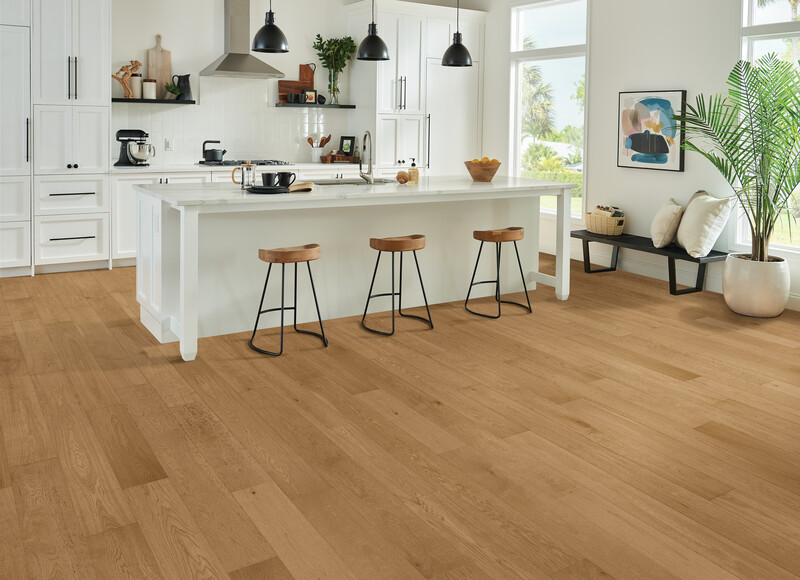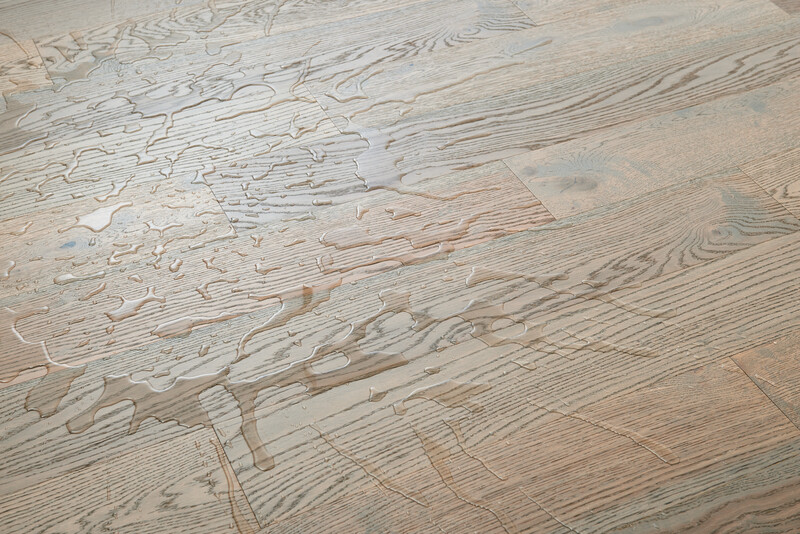Engineered Hardwood Flooring in Kitchens and Bathrooms
Solid hardwood floors represent the dream flooring for many homeowners. Real wood floors bring natural beauty to any room. Unfortunately, however, it’s not always the right choice.
That’s especially true for areas that face moisture concerns. We’re referring specifically to kitchens and bathrooms.
Sure, you can install solid hardwood flooring. With meticulous care and upkeep, it might just do the trick. But it’s a risk. That doesn’t mean, however, you have to turn to hardwood imitations like laminate or vinyl.
The good news is that you can still use a wood flooring material in your kitchen or bathroom — engineered hardwood.

What is an Engineered Floor?
The beauty of an engineered floor is that you’re getting an honest-to-goodness wood floor. However, unlike a solid wood floor that’s hardwood through and through, engineered wood flooring features a layer of wood on both the top and bottom.
The top layer can be made from red oak, white oak, hickory, maple, or another type of wood. However, it’s 100% real wood versus different types of flooring that only mimic hardwood.
Like solid hardwood, engineered hardwood flooring can be sanded and refinished. Therefore, you can achieve greater longevity from your floors compared to laminate, luxury vinyl tile, or other synthetic flooring options. The thicker the wear layer, the more often you can refinish your floors.
No Sacrifices to Get Real Wood Flooring
Engineered hardwood floors are genuine hardwood. Again, they use natural wood. They come pre-finished, so they’re ready to install right away.
Moreover, manufacturers like Hartco typically use an aluminum oxide finish on the flooring, which delivers substantial scratch resistance. Aluminum oxide is
Engineered wood floors are also available in a host of colors and finishes. So you can find one to fit any kitchen or bathroom style — traditional, contemporary, rustic, you name it.
Additionally, you can choose them with surface finishes such as wire brushing and hand scraping. In most cases, the flooring also offers a greater selection of wide plank widths versus solid wood floors.
Most importantly, engineered wood offers one distinct advantage over solid wood flooring: water resistance. And that makes it a superior choice for kitchens and bathrooms.
Engineered Hardwood Flooring is Water Resistant
Engineered hardwood floors feature a core that allows the flooring to withstand moisture more effectively than solid wood. So it’s less prone to warping or damage in humid environments.
Generally, however, that translates to water resistance, not waterproofing. That still leaves the flooring susceptible to water damage if it remains exposed for a prolonged period. As a result, installing an engineered hardwood floor in a bathroom remains somewhat risky, albeit less so than installing a solid wood floor.

Waterproof Engineered Hardwood
However, manufacturers like Hartco have developed waterproof engineered hardwood like HydroBlok®. It includes an innovative, three-part system that protects your floors from water damage. So, you’ll enjoy 100% waterproof protection with real wood flooring, not laminate or vinyl.
Dogwood® Pro is another Hartco engineered flooring option with waterproof performance. The flooring includes densified wood, making it even harder than conventional wood flooring for enhanced scratch resistance. So it’s incredible if you have pets or active kids.
Best of all, you can install either flooring in a bathroom, the most extreme challenge for wood flooring. And if it can handle a bathroom, a kitchen is a walk in the park.
Hartco®: The Best Wood Flooring for Kitchens and Bathrooms
Hartco specializes in real hardwood flooring, including both solid and engineered options. It offers some of the best warranties in the industry. So, if you have a room where you’d like to install hardwood flooring, Hartco has the solution.
You can find a Hartco dealer near you using our retail locator.
Engineered Hardwood Flooring: Common Questions and Concerns
If you’re not familiar with engineered floors, you may have some concerns. Here are some of the more notable questions homeowners ask.
Is engineered hardwood less durable than solid hardwood?
Absolutely not. In many instances, it’s even more durable and scratch-resistant. So, they can withstand the kind of traffic you’d encounter in a kitchen. And they’re easy to maintain.
Can I install engineered hardwood over an existing floor?
One of the other advantages of engineered hardwood is that it can be floated. You can indeed install them over existing floors, provided they’re in good condition and do not have transition issues.
Is engineered hardwood expensive?
The good news is that most engineered floors cost less than solid hardwood floors, allowing you to enjoy the look of hardwood in your bathroom or kitchen for a lower price.
How long do engineered hardwood floors last?
Good engineered hardwood flooring can last 25-30 years. That’s equivalent to the lifespan of synthetic flooring options, such as laminate and LVT.
But remember. You can sand and refinish the flooring. So they can last 50 years or more.
Hartco’s HydroBlok waterproof engineered hardwoods, for example, come with a 50-year residential limited warranty. So, you can install one in your kitchen and bathroom and not have to worry about it again.
